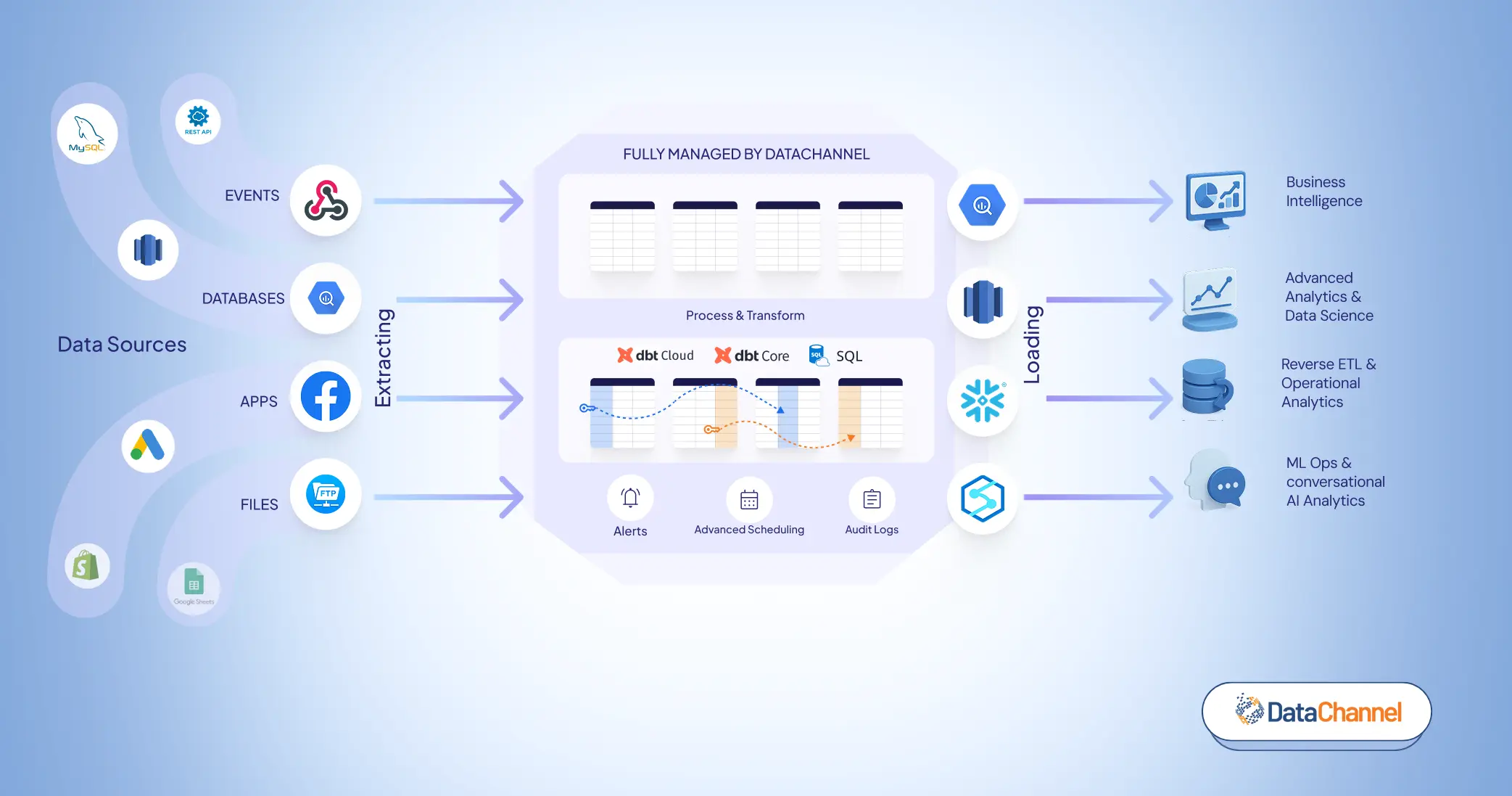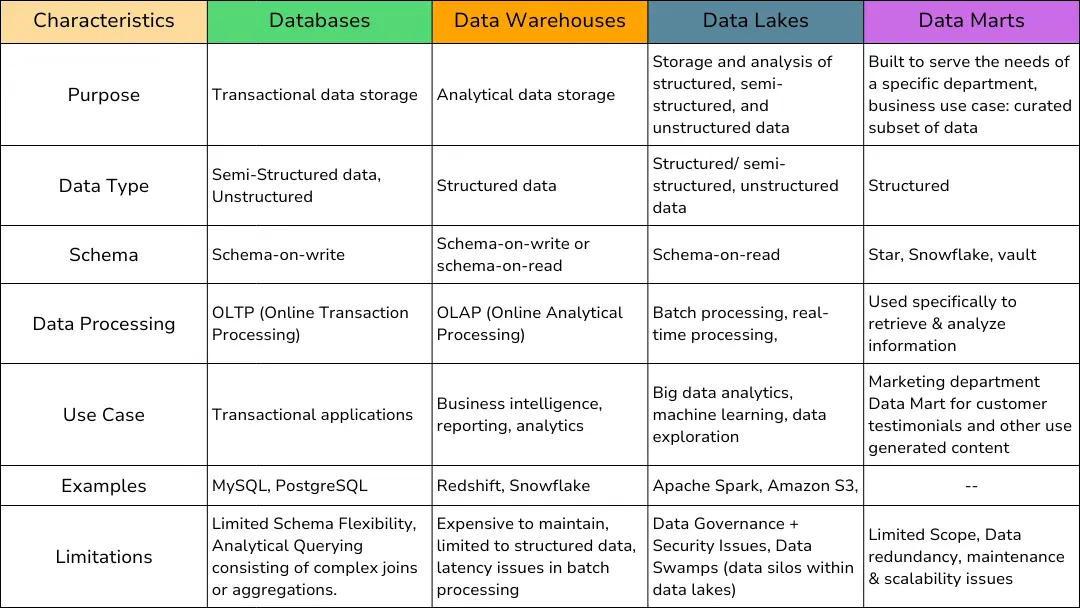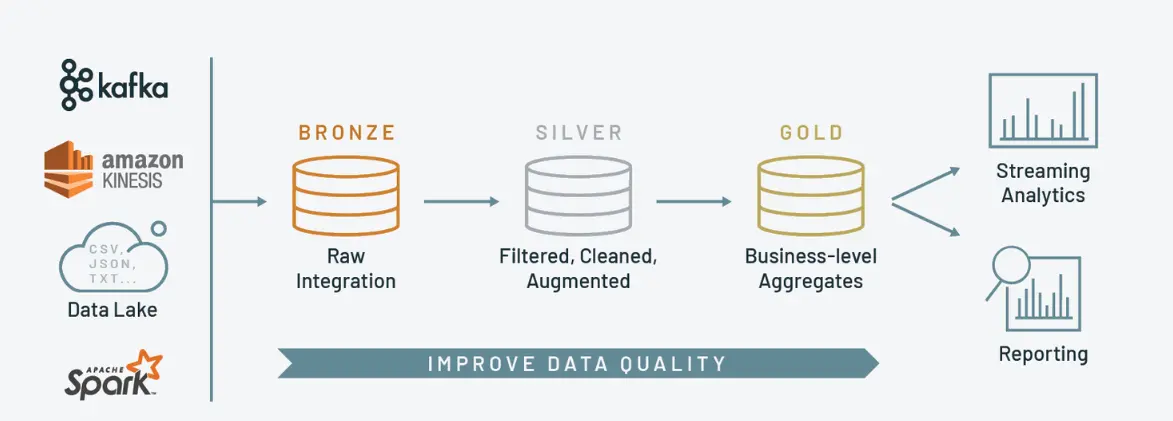
The Best Applications of Data Warehousing

Table of Contents
- Introduction
- Different Cloud Data Storage Solutions
- Rise of the Data Lakehouse
- What is a Data Warehouse?
- The best applications of Data Warehousing
- How does DataChannel Work with Warehouses?
- AI-Powered Analytics with Neo
- Conclusion
- Frequently Asked Questions (FAQs)
Introduction
The data warehousing concept is not new to the business world, where every decision the organizations make is based on data. However, the applications of data warehousing are constantly entering new domains, and additional innovative ways are continually being established to leverage this path breaking technology. Being able to effectively utilize data warehousing technology helps business managers land on better decisions through strategic planning and surpass their competitors in the long run.
Data warehouses structure your raw data, set a solid foundation for data storage, and provide the foundation for actionable insights. Is your business also looking for ways to accelerate the pace of data integration processes, analysis, and reporting, implementing a cloud-based data warehousing solution will help. DataChannel is one such effective and reliable solution at a reasonable cost. With an effective data warehouse, you get the power to consolidate all your data strewn over different source systems and platforms into a single place for effective reporting and analysis. Expert Data Warehouse Consultants can help you design and implement a solution tailored to your specific needs. According to Allied Marketing Research the global data warehousing market is projected to grow at over 10% CAGR to reach up to $51.18 Billion by 2028.
But before we discuss “the best applications of data warehousing,” let’s first get to know a little about the different cloud storage solutions available in the market today so that you get a brief idea about which one to invest in for your business and its needs.
Different Cloud Data Storage Solutions
Below is a tabular format comparing databases, data warehouses, and data lakes based on various characteristics

Rise of the Data Lakehouse
Traditionally, companies relied on data warehouses for structured data and data lakes for unstructured data. While effective, running two separate systems often led to higher costs, complex management, and challenges with data quality. The data lakehouse emerged as a solution by combining the strengths of both - supporting structured, semi-structured, and unstructured data in a single architecture.
Lakehouses are typically built on the Medallion Architecture:
- Bronze layer: raw data ingestion from multiple sources
- Silver layer: initial cleaning and structuring
- Gold layer: granular-level data transformation after running suitable joins + aggregates, and the data finally becomes ready for use by data consumers.

This approach ensures data quality improves progressively across layers. While data warehouses also follow a layered flow (Raw > Stage > Transformed), they lack the flexibility of handling unstructured data, which makes lakehouses a more versatile option for modern use cases.
That said, let’s dive into one of these cloud data storage solutions, ‘the data warehouses.’ We’ll be diving in detail into their uses and best applications across industries and departments. We’ll also cover FAQs related to data warehousing towards the end of the blog.
What is a Data Warehouse?
A data warehouse is a type of data management system which works as a central repository of information designed to store enormous amounts of data aggregated from several different sources for reporting and analysis purposes. It helps with the report creation that assists business managers in dealing with complex queries that come in between making critical business decisions. With an effectively functional data warehouse, supported with the ETL best practices, it becomes way easier for organizations to get hold of all their business data to ensure the growth and success of their businesses.
Data flows into a data warehouse from transactional systems, relational databases, and other sources, typically on regular predetermined intervals. Business analysts, data engineers, data scientists, and decision makers then access the data through business intelligence (BI) tools, SQL clients, and other analytics applications. ETL processes are typically employed to move data to a data warehouse and several ETL tools are available to guarantee reliable and secure data movement.
The best applications of Data Warehousing
Every organization, no matter in what industry it works in or how big or small it is, requires a data warehouse to connect its disparate sources for anticipating, analysis, reporting, business intelligence, and facilitating robust decision-making. These services are also required at a reasonable cost and optimal value. Here, we are listing down the best applications of data warehousing across different industries.
- E-commerce: E-commerce platforms need to gather key marketing metrics (such as clicks, impressions, website visitors, etc.) from marketing tools and use that to approach their customers in a better way. This is where data warehouses help. Replicating data, tracking & visualizing KPIs such as conversion rates, churn rates, and return on ad spends, safe storage, etc. help companies perform better. In recent times, amazon redshift is the most popular warehouse being used for marketing analytics, because of its user-friendly UI and flexibility.
- Retail: Data warehouses can be used by retailers to easily identify products with high demand and the fastest selling demand. The data can then be used to react to a rise or fall in consumer demand quickly, which can ultimately be used to gain a competitive advantage. Reverse ETL is a popular concept that leverages data from warehouses and helps target audiences better. They are the mediators between wholesalers and end customers, and that’s why it is necessary for them to maintain the records of both parties. For helping them store data in an organized manner, the application of data warehousing comes into the frame.
- AI/ML: With many companies embracing AI for their data journey, it’s critical to get a reliable data warehouse now. AI enables data maturity, which is intertwined with the flexibility, scalability, and agility that a warehouse offers. On the other hand, machine learning is used on the data after the data has been replicated and transformed in the warehouse, to help newer business models emerge and advance digital disruption.
- Agritech: Data storage is a must when it comes to the new age of farming. Data related to crop yield, weather conditions, pesticides, crop inventory and so much more demands a data warehouse. With advanced analytics, engineers and business analysts are able to figure out inefficiencies in the ecosystem, such as problems in the soil quality, unnecessary use of pesticides, etc. and iron them out.
- Sustainability and climate action: Climate data requires a versatile data infrastructure, with cloud-first models for warehouses. To bring out sustainability insights, the data architecture must be able to integrate raw data from multiple sources and make it easy for end-users for making predictions and effective decisions related to climate change.
- Manufacturing & Supply chain: Being one of the industries involving a higher number of intermediaries, the supply chain industry needs data warehouses to limit the number of data silos and ultimately human error. Data warehouses can help in inventory management (which items are low in count and what is the cost of each step in the life cycle), all the data related to vendors, logistics (for example: timestamp data related to product delivery), and ultimately serving the customer better.
- Healthcare: With constant advancement in healthcare, the data captured by machines is huge. To digitally improve hospital infrastructure, reduce wait time, and make processes more efficient, data warehouses are making data work constantly in this field. Getting personalized healthcare can be possible with a single platform (such as having one place for all diagnostics, tests, prescriptions, and follow-ups). All the clinical, financial, and employee data are stored in the warehouse, and analysis is run to derive valuable insights to strategize resources in the best way possible.
- Banking & Finance: Data security is critical for the BFSI sector, and data warehouses solve that problem by vouching for industry-standard security compliances. The warehouses can be used to get updates about customer deposits, loans, funds, deposits, etc., and a better understanding of the performance of different branches. The right solution helps the financing industry analyze customer expenses that enable them to outline better strategies to maximize profits at both ends.
- Financial Auditing: With access to real-time financial data, warehouses ensure decisions related to the business’s current financial performance can be reached quickly. Data warehouses enable the collection of data on a daily basis and information can then be regularly used to identify any discrepancies in financial reporting & audits.
- Pharmaceuticals: As data warehouses make data more accessible, it’s now being used for making better strategic decisions and identifying & developing customer buying trends in pharmaceuticals. This results in better customer targeting, pre-call analysis as well as post-call assessments, helping the pharma industry at scale.
How does DataChannel Work with Warehouses?
Well, to be honest, we believe in finding solutions that help our partners in the long term and can adapt to evolving changes in the system. DataChannel is the most advanced ETL & Reverse ETL tool which not only follows all the ETL best practices listed above but also ensures you never have to worry about any of these challenges again. Through the easy-to-use web interface you can use its 100+ pre-built integrations to set up your data warehouse and populate it with the data you need in minutes for free. Building a data warehouse from scratch is a tedious task, and that’s why we offer a platform that helps you put your data in industry-grade warehouses, manage the data flow all customized to your requirements. Here are some benefits our platform offers:
DataChannel is the most advanced ETL & Reverse ETL tool which not only follows all the ETL best practices listed above but also ensures you never have to worry about any of these challenges again. Through the easy to use web interface you can use its 100+ pre-built integrations to set up your data warehouse and populate it with the data you need in minutes for free.
AI-Powered Analytics with Neo
(Ask) Neo integrates generative AI to make data access and interpretation easier. It allows users to interact with data through conversational queries, making analytics accessible to both technical and non-technical users. Key capabilities include:

- Natural Language Search: Enables flexible exploration and ad hoc analysis of large-scale enterprise data, supporting deeper analysis of textual data without advanced skills.
- Automated Data Storytelling: Delivers concise, decision-focused insights and visualizations through natural language narratives to speed up decision-making.
- Metrics Monitoring: Provides suggested questions and personalized insights for tracking short- and long-term metrics, identifying trends and anomalies.
- Automated Data Visualization & Reporting: Offers interactive dashboards, reports, and charts that communicate insights clearly within seconds.
Conclusion
Data warehouses help teams zero in on the data that matters, speeding up insights and improving decisions. When implemented effectively, they boost efficiency, strengthen governance, and give organizations a real competitive edge.
With no-code, cloud-native platforms like DataChannel, combined with the power of AI analytics, businesses can unlock unparalleled growth with data warehouses acting as dynamic engines for custom business use cases. Companies that pair these innovations with strong governance will turn data marts into a lasting advantage instead of an operational burden. Data Warehouses can facilitate reporting, business intelligence, and robust decision-making at a reasonable cost and with solid value.
FAQs (Frequently Asked Questions)
- What are the benefits of data warehouse?
Some of the benefits of a data warehouse are:
Time-saving: It saves time as the company does not have to rely on manual data aggregation & reduced dependency on specialized technical resources.
Improved Data Quality: Aggregated data is transformed to make it ready to use for downstream reporting or data activation needs
- Types of Data Warehouses
- Enterprise Data Warehouse (EDW): A large, centralized data warehouse designed for decision-making across an entire organization. It provides a single source of truth by integrating data from various operational systems.
- Operational Data Store (ODS): A real-time or near-real-time repository for operational data used for daily operations and reporting. It acts as a source for the EDW.
- Data Mart: A focused subset of an EDW, designed to serve the specific needs of a particular business line or department, such as sales, marketing, or finance.
- Cloud Data Warehouse: A data warehouse hosted in the cloud, offering high scalability and flexibility to store and process large datasets.
- Virtual Data Warehouse: A logical representation of data that provides access to data from multiple disparate sources without physically consolidating it into a single repository.
- Hybrid Data Warehouse: A combination of on-premises and cloud-based data storage solutions, offering the benefits of both.
- Disadvantages of Data Warehouses
- Cost and Effort
- Data and Flexibility Issues
- Operational Limitations
- Security and Risk

Try DataChannel Free for 14 days









